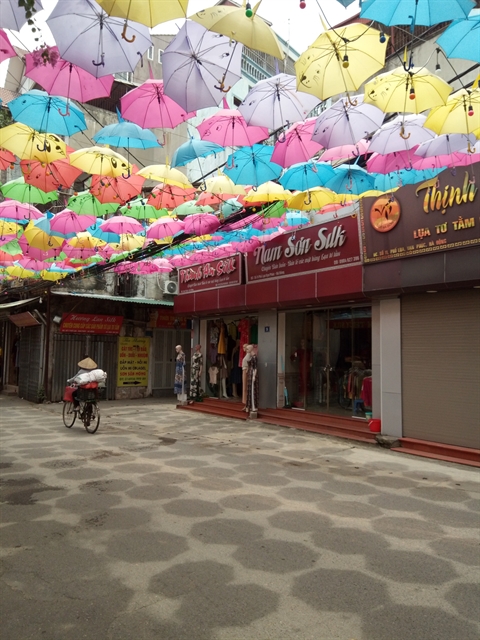[ad_1]
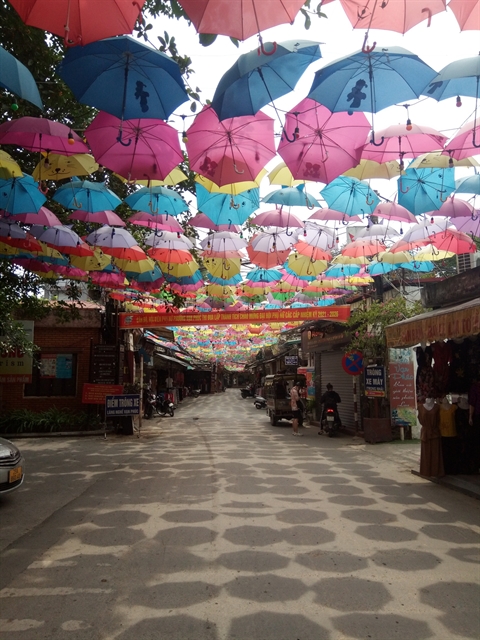
Thanh Nga
I went to Vạn Phúc Silk Village on Sunday, just in time as it happens because the day after my visit, Hà Nội’s authorities ordered all non-essential shops to close to prevent the spread of COVID-19 in the capital.
The old village is more than 1,000 years old and located in Vạn Phúc Ward, Hà Đông District, more than 10km from the centre of Hà Nội.
The pandemic may have changed the way we all live our lives, but the village remains as beautiful as ever. A lack of visitors because of the current situation meant it was certainly quieter than usual for my visit.
If in the past, coming to the silk village, visitors would see busy streets and merchants on both sides of the road selling scarves, Vietnamese traditional long dress, bags, clothes with a variety of designs.
In days gone by, thousands would visit, but not anymore. It may still look as beautiful as before, but the lack of crowds did make this normally vibrant area appear a little sad.
Most stalls were closed, just the odd one opening up in the hope of passing trade.
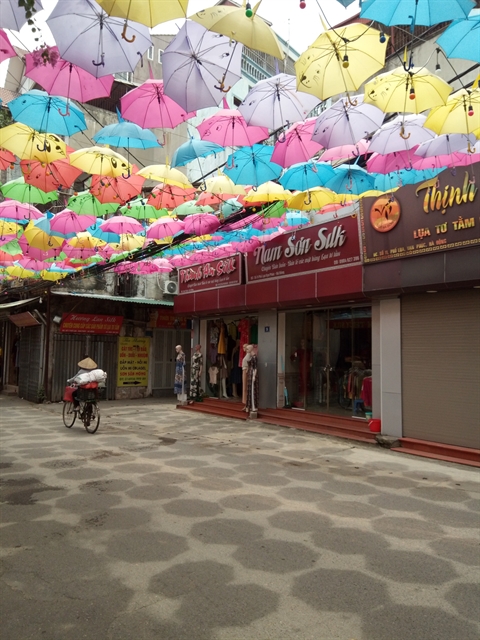
Visiting Thúy An Silk Shop, owner Nguyễn Thị An was busy embroidering flowers on a red silk shirt.
“The COVID-19 pandemic is complicated, so customers are afraid to go out to shop,” she said. “On weekdays, there are no people, but on weekends, there are only a few customers.
“I use this time to sew buttons for these silk shirts ordered by my customer without charge. If I add the labour of hand embroidery, each shirt will increase to about VNĐ100,000 (US$4.3). It takes me half-day to do it but because of the virus, it is difficult to sell, so I decide to embroider by hand to attract customers without increasing the price of the product. Before the pandemic, the handmade embroidery also costs extra money.”
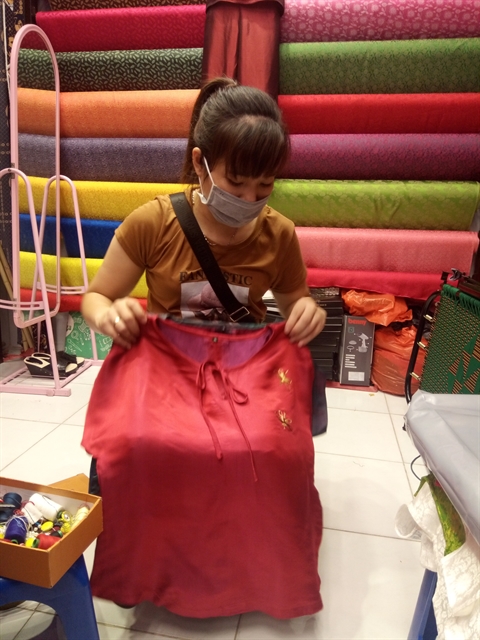
An has two stalls in Vạn Phúc Village. Both operate moderately in the current climate.
An said her family’s silk craft is handed down from generation to generation. Her family weave themselves but also hires tailors to sew products to sell.
She added: “I just hope the pandemic will end soon so that I can welcome visitors coming in and out and we can be as busy as before.
“During this time of pandemic, I redirect to sell online on my Facebook page. I also make hand-embroidered masks for sale. Because the pandemic is increasing in HCM City, when my business partners in HCM City have customers, they call me directly to ship to their customers, instead of shipping to HCM City as before.”
At Sơn Hạnh Silk, the shop owner was engrossed in a Vietnamese movie on television. There were no buyers so she needed to do something to pass the time of day.
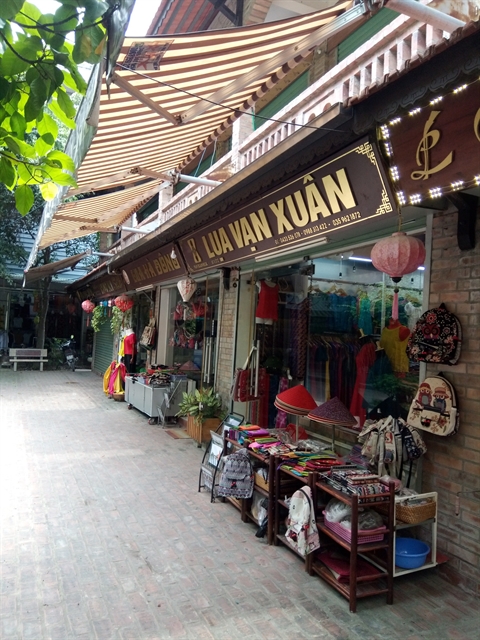
A little further down the road at Vạn Xuân Silk Shop, owner Ngô Hồng Trường, said: “The COVID-19 pandemic has made things very difficult. There are days when there is not even a single item sold and exports have stopped altogether.”
Like many other business households, Trường’s family has been making silk for many generations with high quality silk products. Previously, he also put looms in front of the shop for visitors to watch him practice his craft, but now there is no need as there is both nothing to make, and no visitors to impress with his skills.
While I was talking with Trường, two customers did come in and the joy in his face was plain to see. However that quickly changed as both left without spending any money.
Phạm Khắc Hà, chairman of the Vạn Phúc Silk Weaving Village Association said because of the pandemic, the number of visitors to the craft village decreased by about 80 per cent since the beginning of the year.

Efforts to restore production and business
According to shop owners, because many customers can’t come to buy goods directly, they have been promoting sales through online networks such as Facebook and Zalo. Some stalls in the village reduced prices in order to attract customers, but still business was poor.
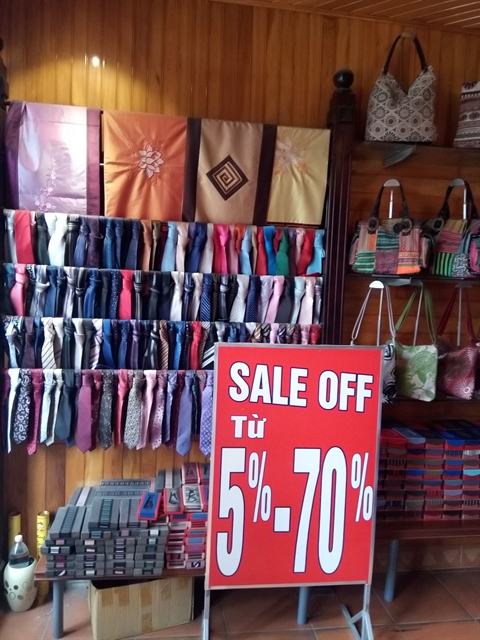
“Non-essential stores have to close since the beginning of this week, so the difficulty is even more difficult,” said Hà.
“The village doesn’t have visitors and buyers these days but we still have to try to maintain our traditional profession.”
Hà’s family has been making silk for generations. Currently, he has two shops in the village.
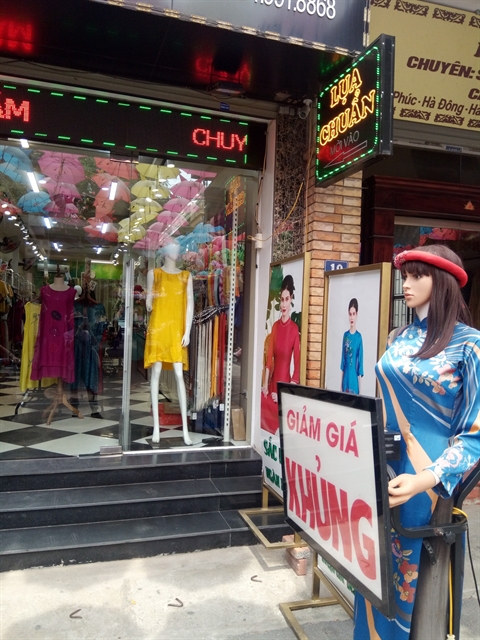
He added: “Now my shops are also selling online, fortunately, I can still sell about 60 per cent compared to selling offline,
“The closure of production and sales causes many businesses and production facilities to suffer economic losses.
“However, thanks to the support of the Government, taxes were reduced, so it also reduces difficulties. I have also proposed to the leaders of Vạn Phúc Ward to research and support the craft village to further reduce the price of rent. Most of us rent space from households who also have difficulties in the COVID-19 pandemic so they don’t reduce the rental charges for us any more.
“We still find ways to stay strong such as promoting online sales, spending a lot of time researching the market, creating new models.” said Hà.
Seeing that consumer demand for face masks is still high, Nguyễn Thị Oanh and some other business owners have turned to making cloth masks for sale, adding images and colours to make them more attractive.
So far her masks are proving popular, and she plans to make more when social distancing regulations are eased.
Oanh said: “During this difficult period, if employees lose their jobs, they will lose their income, their life will be extremely difficult. We have to find many ways to minimise losses in production and business, so that employees can still have jobs and have confidence to stay with businesses.”
In recent years Vạn Phúc Silk Village, witnessed a revival, and business was good thanks mainly to introducing tourists to the area.
But just like many other traditional crafts, it has suffered because of the pandemic.
The saying goes that there is nothing quite as smooth as silk. For the traders in Silk Village, they hope business will soon be smooth again, and the whole world can enjoy the amazing creations crafted right here on the edge of Việt Nam’s capital city. VNS

[ad_2]
Source link
